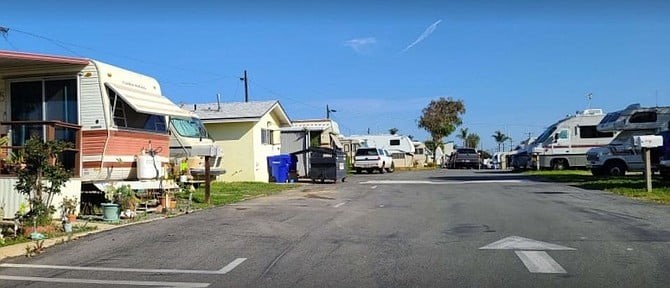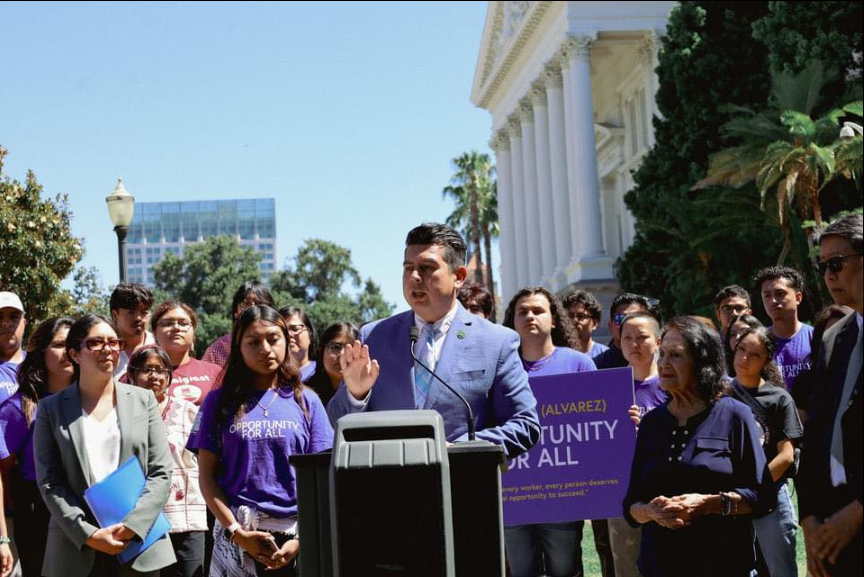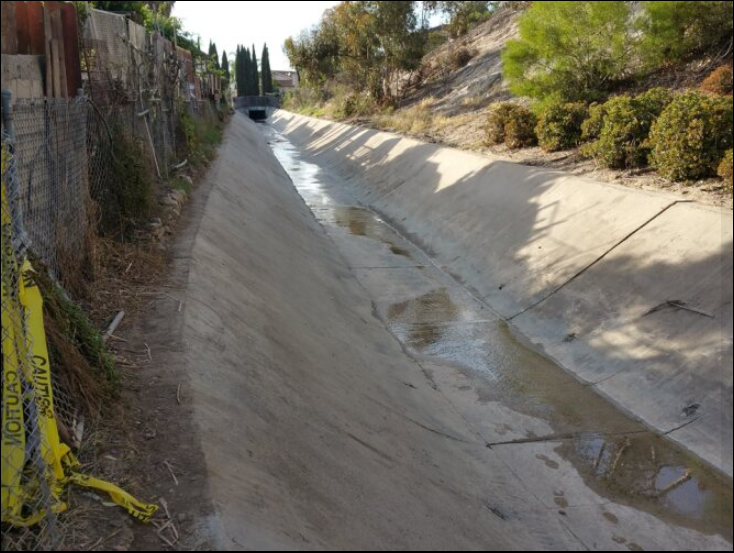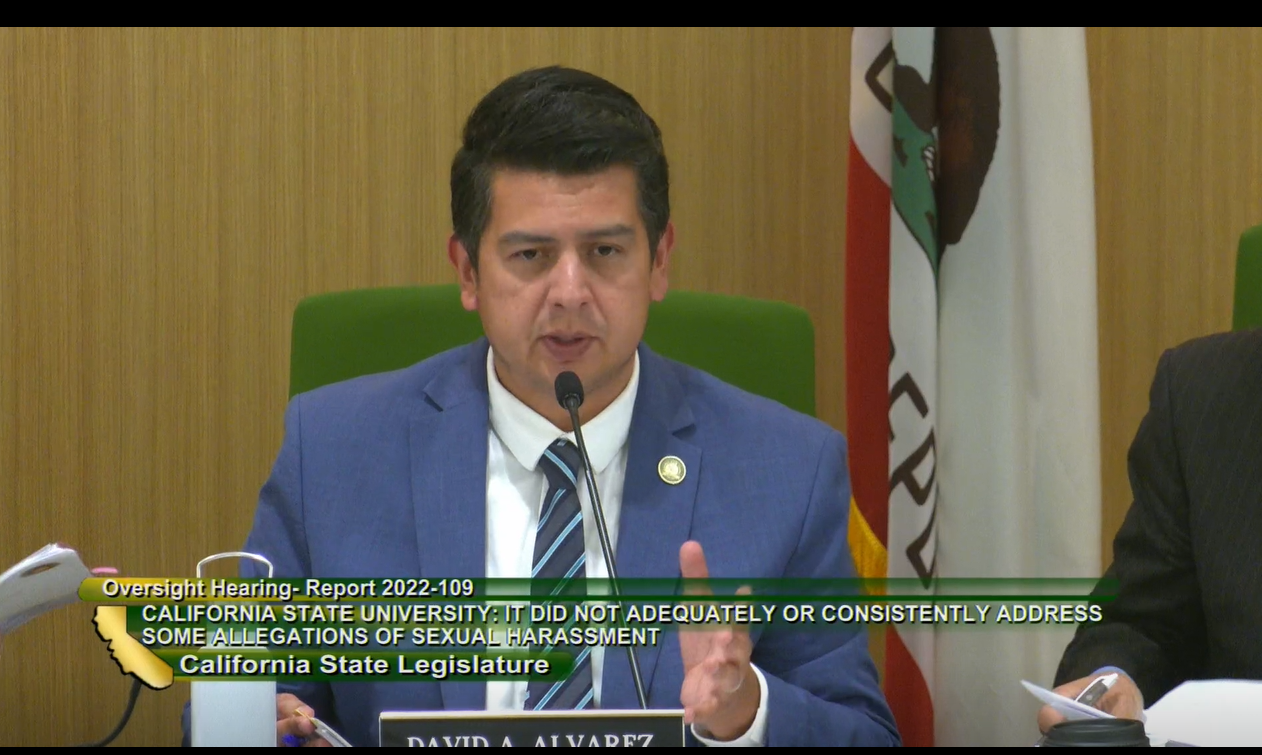2024 Legislation
- AB 2501 - Cutting the Green Tape
- AB 1005 - Improving Access to IHSS
- AB 1472 - RV Shuffle Prohibition Act
- AB 2586 - Opportunity for All
- AB 3227 - Storm Channel Maintenance Efficiency Act
- AB 1886 - Builders Remedy Clarification Act
- AB 2326 - Title IX Oversight and Compliance Act
- AB 2633 - Brilliance without Borders Act
- AB 2430 - Duplicative Monitoring Fee Elimination Act
- AB 2429 - The Fentanyl Education Act
Assembly Bill 2501 - Cutting the Green Tape

Summary
AB 2501, the "Cutting the Green Tape" bill, will authorize the State Water Resources Control Board and Regional Water Quality Control Boards to accept funds from other public agencies. The bill addresses the growing number of such projects and aligns the Water Boards' authority with other state agencies.
AB 2501 will allow for improved staffing levels at local water boards to enable more efficient review of permits which in turn will get projects built faster.
This bill was signed into law on 09/26/24 and will take effect on January 1, 2025.
Background and Existing Law
- The Water Boards administer federal Clean Water Act programs and oversee water quality permit implementation.
- The Water Boards can accept funding from other state agencies, but not from local agencies which hampers their ability to provide permitting and technical assistance work.
- The need for the bill arose because the Water Boards lack the statutory authority to accept funds from public agencies, which has led to insufficient resources for efficiently reviewing permit applications for urgent projects.
Bill Overview and Benefits
- AB 2501 would authorize the State Water Board to accept funds from public agencies to support dedicated staff to complete project reviews for water quality and ecosystem restoration projects.
- Aligns Water Boards' authority with other state agencies like California Department of Fish and Wildlife and California Coastal Commission
- More efficient review of permit applications for projects with public benefits
- Better support for urgently-needed climate change adaptation and ecosystem restoration projects
- Improved coordination between Water Boards and local agencies
AB 2501 Supporters
- City of San Diego (Sponsor)
- California Chamber of Commerce
- San Diego County Water Authority
- San Francisco Bay Restoration Authority
- Industrial Environmental Association
Questions and Feedback
- Contact my office at (619) 498-8580 or email Assemblymember.Alvarez@Assembly.ca.gov.
Assembly Bill 1005 – Improving Access to IHSS

Summary
Assembly Bill 1005 will improve access to In-Home Supportive Services (IHSS) for vulnerable hospital patients in California. This law requires hospital case managers to evaluate patients' post-discharge needs, provide information about IHSS if, and facilitate the application process to access care.
The goal is to streamline the IHSS application process for terminally ill patients by providing access and information to crucial in-home care services.
This bill was signed into law on 09/21/24 and will take effect on January 1, 2025.
Background and Context
- IHSS is a program administered by the State Department of Social Services and counties.
- Potential IHSS providers must complete a four-step process within 90 days of enrollment.
- County social workers assess applicants' needs to assign an IHSS provider
- This application process can be cumbersome and lengthy, which is problematic for vulnerable and terminally ill patients.
AB 1005 Overview and Benefits
- This bill mandates hospital case managers to evaluate patients post-discharge needs and provide information on IHSS services
- Applies to Medi-Cal beneficiaries diagnosed with terminal illness and are being discharged from acute care hospitals.
- Hospital case managers or discharge planners must:
- Evaluate the patient's likely need for post-hospital services by assessing the patient's ability to access those services
- Ask if the patient is interested in IHSS information if in-home care is needed
- Provide IHSS program information and application process details if interest is expressed
- Inform about the option for family members to become IHSS providers
- Creates a more efficient process for terminally ill patients to access IHSS
- Address the issue of standard IHSS application timelines outliving terminally ill patients by providing the most updated information for IHSS.
AB 1005 Supporters
- California Commission on Aging
- California Senior Legislature
- Compassion & Choices
- UDW/AFSCME Local 3930
Questions or Additional Information:
- Contact my office at (619) 498-8580 or email Assemblymember.Alvarez@Assembly.ca.gov.
AB 1472 - RV Shuffle Prohibition Act

Summary
Assembly Bill 1472 will provide common tenant protections for people living in a recreational vehicle (RV) in the City of Imperial Beach. This new law will prohibit RV parks from evicting and re-registering tenants in a way that prevents them from gaining resident status, which occurs after 9-consecutive months of occupancy.
This practice, known as the "RV shuffle" has been causing hardship for long-term RV residents in Imperial Beach. The bill includes penalties for violations and is similar to existing protections.
This bill was signed into law on 09/21/24 and will take effect on January 1, 2025.
Background and Context of the “RV Shuffle” Problem
- California is experiencing a significant housing shortage
- A growing population, especially those on fixed incomes, are residing in RVs
- RV residents are currently exempted from eviction and rent protections afforded to apartment and home renters.
- Some RV parks have been requiring long-term residents to renew agreements twice per year to avoid gaining "Resident" status.
- This practice causes mental and financial hardship on tenants, many of which are vulnerable and rely on fixed incomes
- The Recreational Vehicle Park Occupancy Law governs RV park tenancies.
- Civil Code Section 799.31 defines an RV Tenant as a "Resident" after 9 months of occupancy.
AB 1472 Overview and Benefits
- Prohibits RV park owners from reregistering tenants if the purpose is to prevent them from gaining a certain tenancy status, thereby providing them with tenant protections.
- Adds a $500 penalty for violations
- Applies only to the City of Imperial Beach
AB 1472 Supporters
- City of Imperial Beach
- Public Law Interest Project
- ACCE San Diego
Questions or Feedback:
- Contact my office at (619) 498-8580 or email Assemblymember.Alvarez@Assembly.ca.gov.
AB 2586 – Opportunity for All

Summary
AB 2586, known as the "Opportunity for All" bill, will allow equal access to campus job opportunities for all students in California's higher education systems, regardless of immigration status. The bill addresses the current barrier that prevents undocumented students from obtaining paying jobs on campus, which are often essential for degree completion and financial support.
The bill is based on a legal analysis that concludes federal prohibitions on hiring undocumented individuals do not apply to state governments acting as employers.
AB 2586 builds on the successes of AB 540 (2001) that permitted students who attended high school in California to qualify for in-state tuition fees at public universities and colleges, regardless of immigration status.
This bill was vetoed by Governor Newsom.
Background and Context
- California is investing billions in higher education to advance access, affordability, equity, and success.
- In 2001, California passed AB 540 to allow all students, regardless of immigration status, to access public higher education institutions at the in-state tuition rate.
- California has educated over 80,000 undocumented students who are currently barred from obtaining paying jobs and become productive members of our economy.
- Legal scholars have identified that the Immigration Reform and Control Act of 1986 (IRCA) does not apply to state governments acting as employers. This interpretation allows California's higher education systems to hire undocumented students.
Bill Overview and Benefits
- AB 2586 would allow equal access to campus job opportunities for all students, regardless of immigration status
- Applies to University of California, California State University, and California Community Colleges
- Remove barriers to employment for undocumented students who have been educated in California, so they can become productive members of society.
- Provides equal access to employment opportunities for undocumented students
- Allows students to financially support themselves while pursuing their degrees
- Positions California as a model for the rest of the nation in supporting undocumented students
- Aligns with California's goal of maintaining its status as an economic powerhouse.
- Enables students who have obtained higher education in California to become productive working taxpayers.
AB 2586 Supporters
- Undocumented Student-Led Network (Sponsor)
- CA Federation of Teachers (Sponsor)
- ACLU California Action
- California Faculty Association
- California Immigrant Policy Center
- California Labor Federation, AFL-CIO
- University of California Student Association
Questions and Feedback
- Contact my office at (619) 498-8580 or email Assemblymember.Alvarez@Assembly.ca.gov.
AB 3227 - Storm Channel Maintenance Efficiency Act

Summary
Assembly Bill 3227 will streamline storm water channel maintenance in California by providing specific exemptions to the California Environmental Quality Act (CEQA) for routine maintenance of certain stormwater channels. The bill seeks to eliminate administrative delays, clarify mitigation requirements, and allow local agencies to perform necessary storm water infrastructure maintenance more efficiently to prevent flooding and protect public health and safety.
This bill was signed into law on 09/26/24 and took effect immediately.
Background and Context
- More frequent and intense storm events have significantly increased maintenance needs of stormwater infrastructure.
- Lack of proper and timely maintenance increase risks of flooding, as San Diego experienced in January 2024.
AB 3227 Bill Overview
- Provides local governments with exemption to the California Environmental Quality Act for routine channel maintenance.
- Only applies to channels that are fully concrete or channels that have less than a 100-year storm capacity.
- Maintains obligation to follow other environmental regulations including mitigation requirements for impacts on wetlands and sensitive species.
- Streamlines local agencies' ability to perform required municipal services and minimizes potential for CEQA-related hurdles including appeals and lawsuits.
- Includes an urgency clause for immediate implementation and an automatic date of January 1, 2030.
AB 3227 Supporters
- City of San Diego (Sponsor)
Questions and Additional Information
Contact my office at (619) 498-8580 or email Assemblymember.Alvarez@Assembly.ca.gov.
AB 1886 - Builders Remedy Clarification Act

Summary
AB 1886 clarifies who determines if a housing element is in substantial compliance with Housing Element Law. The bill specifies that the California Department of Housing and Community Development (HCD) or a court has final say on housing element compliance, and that projects submitted during non-compliance periods remain eligible for the Builder's Remedy even if the city later achieves compliance.
Every city and county in California should be doing their part to provide housing for the state’s residents. AB 1886 will boost development of housing in cities and counties that have not adopted a housing plan that meets the need of their community.
This bill was signed into law on 09/21/24 and will take effect on January 1, 2025.
Background of the Builder's Remedy and Housing Element Law
- Since 1969, California has required that all local governments adequately plan to meet the housing needs of the community (Housing Element Law).
- Builders Remedy was introduced in 1990 as part of the Housing Accountability Act, and prohibits the denial of certain housing projects if specific conditions are met, such as not having passed an adequate Housing Element.
- The Builder’s Remedy was designed to incentivize cities to meet housing needs but they have rarely been used- only one known attempt between 1990 and 2021.
- As of August 2024, 169 local jurisdictions in California (32%) have not adopted a compliant housing element.
- HCD tracks housing element plans online at https://www.hcd.ca.gov/planning-and-community-development/housing-open-data-tools/housing-element-review-and-compliance-report
Purpose of AB 1886
- Clarifies that only HCD or a court can determine when a city’s housing element is compliant
- Ensures projects submitted during non-compliance periods remain eligible even if a city later complies
Conditions for when Builder's Remedy can be used
- City lacks a compliant housing element, which means a City or County has not adopted a plan that meets the housing needs of the community.
- Project won't have adverse health and safety impacts
- Project doesn't violate state or federal law
- Project is not on agricultural land
- Project is consistent with city zoning or general plan
Questions and Feedback
- Contact my office at (619) 498-8580 or email Assemblymember.Alvarez@Assembly.ca.gov.
AB 2326 - Title IX Oversight and Compliance Act

Summary
Assembly Bill 2326, known as the Title IX Oversight and Compliance Act, is a groundbreaking bill that aims to address sex discrimination in higher education institutions. The bill requires the University of California, California State University and California Community College systems to present annual Title IX compliance reports to the Legislature, detailing their efforts to prevent and address sex discrimination on campuses.
This legislation is in response to recommendations from the "A Call to Action" report by the CA Assembly Committee Higher Education and the State Auditor’s Oversight Report: “CSU did not adequately or consistently address some allegations of sexual harassment”, to improve accountability and oversight on this critical issue for California students.
This bill was signed into law on 09/26/24 and will take effect on January 1, 2025.
Background and Context
- Title IX federal laws are intended to protect all people, regardless of their sex or gender, from discrimination of any kind in an educational institution.
- In August 2023, the California State Auditor published Report 2022-109 that found the California State University system had failed to adequately respond to or investigate Title IX violations of sexual misconduct.
- Hearing where this report was presented can be watched online HERE.
- Hearing where this report was presented can be watched online HERE.
- In 2023, the California Assembly Committee on Higher Education published a report called "A Call to Action", which identified recommendations for preventing and addressing sex discrimination on campuses.
Bill Overview and Benefits
- AB 2326 implements recommendations #4 and #11 from the 2024 "A Call to Action" report.
- The bill will require annual presentations to the Legislature by the University of California (UC), California State University (CSU) and the California Community College (CCC) leadership on their efforts to prevent discrimination.
- The reports shall detail how each institution is complying with state and federal laws to prevent sex discrimination.
AB 2326 Supporters
- American Association of University Women - California and Generation Up (Sponsor)
- Office of Lieutenant Governor Eleni Kounalakis
- California Federation of Teachers
- Cal State Student Association
- California Faculty Association
- California State University Employees Union
- Faculty Association of California Community Colleges
- Ignite
- Safe Campuses Coalition
- Student Senate for California Community Colleges
- Youth Power Project
Questions or Feedback
- Contact my office at (619) 498-8580 or email Assemblymember.Alvarez@Assembly.ca.gov.
AB 2633 - Brilliance without Borders Act

Summary
Assembly Bill 2633, the Brilliance without Borders Act allows the California State University (CSU) system to award joint undergraduate, graduate, and doctoral degrees with international universities. This legislation aims to promote binational academic partnerships, enhance global recognition, and provide students with opportunities for international academic experiences. AB 2633 has garnered support from various organizations and individuals, recognizing the benefits of collaborative degree programs in fostering deeper international connections and academic mobility.
This bill was signed into law on 09/26/24 and will take effect on January 1, 2025.
Background and Context
- International education programs have become more widespread and allows students to gain valuable experience and perspectives from other countries across the world.
AB 2586 Bill Overview and Benefits
- Builds upon existing academic initiatives and allows CSUs to award joint degrees with international universities at undergraduate, graduate, and doctoral levels.
- Recognizes the benefit of enduring international partnerships
- Empowers students to pursue opportunities for academic and scholarly exchange
- Can help attract talented international students to CSUs, enhance global recognition and prestige for participating institutions and promote innovative expertise
AB 2586 Supporters
- The California-Mexico Studies Center, Inc. (Co-Sponsor)
- Latino Education and Advocacy Days (LEAD) (Co-Sponsor)
- City of Chula Vista Office of Deputy Mayor Alonso Gonzalez 2024
- District 1 Supervisor of the County of Imperial, Jesus Eduardo Escobar
- Imperial Valley Economic Development Corporation
- San Diego Organizing Project (SDOP)
- Hispanic Association of Colleges & Universities
Questions and Additional Information
- Contact my office at (619) 498-8580 or emailAssemblymember.Alvarez@Assembly.ca.gov.
AB 2430 - Duplicative Monitoring Fee Elimination Act

Summary
AB 2430 prohibits local governments from charging monitoring fees on affordable housing developments using State Density Bonus Law if they are already subject to monitoring by state agencies. The bill aims to reduce duplicative costs for affordable housing developers by eliminating redundant local monitoring fees, which can be as high as $432 per unit annually.
As an example under current law, a 50-unit apartment complex charged up to $21,800 every year for monitoring that other public agencies may already be doing.
This legislation will consolidate monitoring of affordable housing units to lower development costs and help California meet its housing production goals for low-income households.
This bill was signed into law on 09/21/24 and will take effect on January 1, 2025.
Background and Context
- Most affordable housing projects in California require annual monitoring to ensure property owners are complying with rent restrictions.
- State agencies like TCAC, HCD, and CDLAC conduct monitoring activities
- Property owners are charged annual fees by the agencies that conduct the monitoring
- Some local governments charge additional fees for their own monitoring activities.
AB 2430 Overview and Benefits
- AB 2430 prohibits local governments from charging monitoring fees on certain affordable housing developments that are already being monitored by other agencies.
- The bill applies to projects using State Density Bonus Law that are already monitored by state agencies.
- Duplication of local monitoring fees, up to $432 per unit, adds unnecessary costs to affordable housing development.
- Lowers development costs affordable housing to help California meet housing production goals for low-income households
Exemptions
- Projects using local incentive programs resulting in deeper affordability or moderate-income units
- Projects accepting local funding that results in different affordability than state-monitored units
- Projects accepting funding from sources other than TCAC, CDLAC, CHFA, or HCD and not monitored by these agencies
Questions and Feedback:
- Contact my office at (619) 498-8580 or emailAssemblymember.Alvarez@Assembly.ca.gov.
AB 2429 - The Fentanyl Education Act

Summary
Assembly Bill 2429 requires California school districts with health education graduation requirements to include lessons on the dangers of fentanyl in their curriculum. The bill will help address the growing fentanyl crisis by educating high school students about the risks associated with the drug, its potency, and how to recognize and respond to overdoses. This initiative is part of broader efforts to combat the opioid epidemic, which has disproportionately affected California in recent years.
This bill was signed into law on 07/15/24 and will take effect on January 1, 2025.
Background and Context
- Fentanyl was developed in 1959 and introduced in the 1970s as a powerful synthetic opioid for pain relief. It is approximately 100 times more potent than morphine and 50 times more potent than heroin.
- Fentanyl is driving the deadliest drug epidemic in history and has become the leading cause of death for Americans ages 18 to 49
- Only 2 milligrams (0.08% weight of a penny) of fentanyl can cause an overdose.
- More people have died from synthetic-opioid overdoses than U.S. military personnel killed in Vietnam, Iraq, and Afghanistan wars combined.
- Between 2019 and 2021, California's opioid-related deaths increased by 121%
- In 2021 and 2022, there was an average of about 800 deaths in San Diego County caused by fentanyl or analogs of fentanyl in each year. To put that in perspective, in 2021, San Diego County experienced 88 homicides caused by firearms.
AB 2429 Details and Benefits
- Starting the 2026/2027 academic year, requires high school districts that have health education as a graduation requirement to include lessons on the dangers of fentanyl.
- Mandates specific content for these lessons, including:
- Basic understanding of fentanyl
- Risk factors of using fentanyl
- Recognizing "lacing" of drugs with fentanyl
- Identifying and responding to fentanyl overdoses
AB 2429 Supporters
- Sponsored by San Diego County
- County Health Executives Association of California (CHEAC)
- California Emergency Nurses Association
- California Association for Health, Physical Education, Recreation & Dance
- Victims of Illicit Drugs, Inc.
Questions or Feedback
- Contact my office at (619) 498-8580 or email Assemblymember.Alvarez@Assembly.ca.gov.